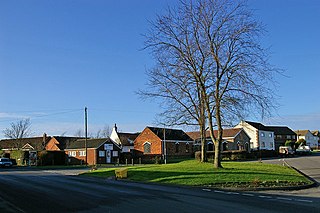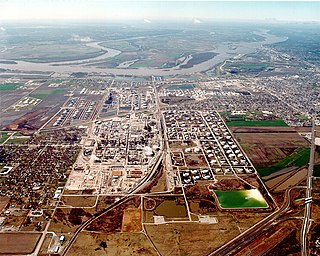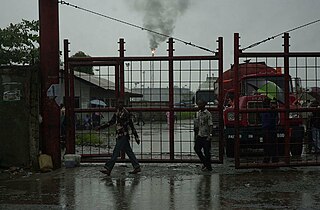
An oil refinery or petroleum refinery is an industrial process plant where petroleum is transformed and refined into products such as gasoline (petrol), diesel fuel, asphalt base, fuel oils, heating oil, kerosene, liquefied petroleum gas and petroleum naphtha. Petrochemical feedstock like ethylene and propylene can also be produced directly by cracking crude oil without the need of using refined products of crude oil such as naphtha. The crude oil feedstock has typically been processed by an oil production plant. There is usually an oil depot at or near an oil refinery for the storage of incoming crude oil feedstock as well as bulk liquid products. In 2020, the total capacity of global refineries for crude oil was about 101.2 million barrels per day.

Singapore Petroleum Company Limited, in short SPC, is a Singaporean multinational oil and gas company. It is involved in the exploration and production of petroleum, refining, trading and petroleum product distribution.

Bayway Refinery is a refining facility in the Port of New York and New Jersey, owned by Phillips 66. Located in Linden and Elizabeth, New Jersey, and bisected by Morses Creek, it is the northernmost refinery on the East Coast of the United States. The oil refinery converts crude oil into gasoline, diesel fuel, jet fuel, propane and heating oil. As of 2007, the facility processed approximately 238,000 bbl/d (37,800 m3/d) of crude oil, producing 145,000 bbl/d (23,100 m3/d) of gasoline and 110,000 bbl/d (17,000 m3/d) of distillates. Its products are delivered to East Coast customers via pipeline transport, barges, railcars and tank trucks.

South Killingholme is a village and civil parish in North Lincolnshire, England. The population of the civil parish at the 2011 census was 1,108.

Fluid catalytic cracking (FCC) is the conversion process used in petroleum refineries to convert the high-boiling point, high-molecular weight hydrocarbon fractions of petroleum into gasoline, alkene gases, and other petroleum products. The cracking of petroleum hydrocarbons was originally done by thermal cracking, now virtually replaced by catalytic cracking, which yields greater volumes of high octane rating gasoline; and produces by-product gases, with more carbon-carbon double bonds, that are of greater economic value than the gases produced by thermal cracking.

The Wood River Refinery is an oil refinery located in Roxana, Illinois, approximately 15 miles (24 km) north of St. Louis, Missouri, on the east side of the Mississippi River. The refinery is currently owned by Phillips 66 and Cenovus Energy and operated by the joint-venture company WRB Refining, LLC (WRB). WRB was formed on 1 July 2007, with Encana taking a 49% interest in Wood River and also Phillips 66's Borger refinery. Encana subsequently spun off oil sands producer Cenovus and ConocoPhillips spun off Phillips 66. In return for a 49% stake in the refinery, ConocoPhillips gained a joint interest in two Alberta oil sands (bitumen) heavy oil projects: Christina Lake (Alberta) and Foster Creek. ConocoPhillips’ interest was sold to Cenovus in May 2017, leaving Cenovus as the sole owner of the assets.
Prax Lindsey Oil Refinery is an oil refinery in North Killingholme, North Lincolnshire, England owned and operated by the Prax Group. It lies to the north of the Humber Refinery, owned by rival oil company Phillips 66, and the railway line to Immingham Docks. Immingham Power Station, owned by VPI Immingham, provides the electricity and heat for the fractionation processes.
The 2001 Humber Refinery explosion was a major incident at the then Conoco-owned Humber Refinery at South Killingholme in North Lincolnshire, England. A large explosion occurred on the Saturate Gas Plant area of the site on Easter Monday, 16 April 2001 at approximately 2:20 p.m. There were no fatalities, but two people were injured.
The Płock refinery is a large oil refinery and petrochemical complex located in Płock, Poland. It is owned by PKN Orlen, and is one of the two crude oil refineries in Poland, the other one is Gdansk refinery. The refinery has a Nelson complexity index of 9.5 and a capacity is 16.3 million tonnes per year or 276,000 barrels per day of crude oil.

Immingham Combined Heat and Power Plant is a combined heat and power, gas-fired power plant adjacent to the Humber Oil Refinery near to South Killingholme North Lincolnshire, England.

The BPRefinery (Kent) was an oil refinery on the Isle of Grain in Kent. It was commissioned in 1953 and had a maximum processing capacity of 11 million tonnes of crude oil per year. It was decommissioned in August 1982.
The East Midlands Oil Province, also known as the East Midlands Petroleum Province, covers the petroliferous geological area across the north-eastern part of the East Midlands of England that has a few small oil fields. The largest field in the province is the Welton oil field, the second largest onshore oil field in the UK.

Petroleum refining processes are the chemical engineering processes and other facilities used in petroleum refineries to transform crude oil into useful products such as liquefied petroleum gas (LPG), gasoline or petrol, kerosene, jet fuel, diesel oil and fuel oils.
Petroleum naphtha is an intermediate hydrocarbon liquid stream derived from the refining of crude oil with CAS-no 64742-48-9. It is most usually desulfurized and then catalytically reformed, which rearranges or restructures the hydrocarbon molecules in the naphtha as well as breaking some of the molecules into smaller molecules to produce a high-octane component of gasoline.
The Ferndale Refinery is an oil refinery near Ferndale, Washington, United States, that is owned by Phillips 66. It is located in the Cherry Point Industrial Zone west of Ferndale and had a capacity of 101,000 barrels per day in 2015, 64th largest in the nation. The Ferndale Refinery produces predominantly transportation fuels consumed in local markets and also includes secondary processing facilities such as a fluid catalytic cracker, an alkylation unit, hydotreating units, and a naphtha reformer. The plant follows a 10-5-3-2 crack spread, meaning that for ten barrels of crude feedstock, the refinery produces five barrels of gasoline, three barrels of distillate, and two barrels of fuel oil.

The Port Harcourt Refining Company,, is a Nigeria-based oil and gas company primarily specializing in the refining of crude oil into petroleum products. It is headquartered in Port Harcourt metropolitan area of Rivers State, southeastern Nigeria. The company is a subsidiary of the Nigerian National Petroleum Corporation (NNPC).
The south bank of the Humber Estuary in England is a relatively unpopulated area containing large scale industrial development built from the 1950s onward, including national scale petroleum and chemical plants as well as gigawatt scale gas fired power stations.

The Ruwais Refinery is operated by the Abu Dhabi National Oil Company (ADNOC). The complex can process up to 837,000 barrels of crude oil and condensate per day, making it the fourth-largest single-site oil refinery in the world and the biggest in the Middle East. The refinery is situated in the city of Ruwais, in Abu Dhabi’s western region. It is highly integrated with ADNOC’s other plants in the Ruwais industrial area – such as the Borouge 3 petrochemical plant.
The Dangote Refinery is an oil refinery owned by Dangote Group that was inaugurated on the 22nd of May 2023 in Lekki, Nigeria. When in full operation, it is expected to have the capacity to process about 650,000 barrels per day of crude oil, making it the largest single-train refinery in the world. The investment is over 19 billion US dollars.
The Teesside oil terminal is a major crude oil reception, processing, storage and export facility at Seal Sands, Middlesbrough. It receives and processes crude oil delivered by the subsea NORPIPE pipeline from the Norwegian Ekofisk field and the UK Fulmar and J-Block fields. The terminal includes facilities for exporting stabilised crude oil and liquefied petroleum gases (LPG) by tanker and pipeline.













